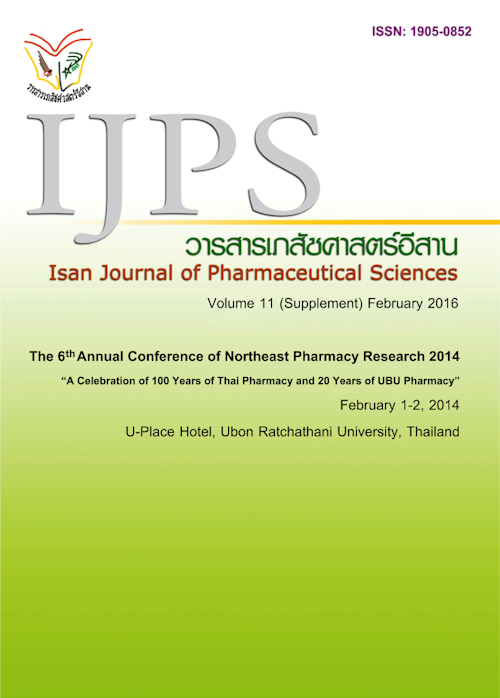A Case Study of Health Literacy of Village Health Volunteers
Main Article Content
Abstract
Introduction: Village Health Volunteer system is the backbone of primary health care in Thailand. Village Health Volunteers (VHVs) are important persons involved in health care development in community. Therefore, VHVs with high health literacy are needed to efficiently provide care and knowledge to the people in their community. The objective of this study was to assess cognitive skill aspect of health literacy of VHVs in Ubon Ratchathani province. Materials and Method: This study was a cross-sectional study. The sample included VHVs of two Tumbon Promoting Hospitals in Ubon Ratchathani province. Data were collected by a self-administered questionnaire during August 2013. A new instrument developed to assess VHVs’ health literacy in this study. The samples were required to read health information in print media and then answered the corresponding questions in order to assess their understanding and interpretation for 20 topics. For data analysis descriptive statistics, nonparametric including, Mann-Whitney U test and Kruskal-Wallis test were used. Results: There were 168 VHVs participated in this study. Most were female (93.3%) and married (77.8%). Their average age was 47.8 + 10.3 years old. One half of them was graduated at primary school level or lower (51.2%). About thirty six percent worked in agricultures (36.3%) and 33.9% were employees. Nearly two thirds had working duration as VHVs more than two years (63.8%). Majority of them had average monthly income 5,000 Baht or less (67.1%). The samples had average health literacy score as 14.8 ± 3.2 (Mean + SD) out of 20 points. There were significant associations between VHVs’ characteristics including age and education and health literacy scores (p< 0.01). Conclusion: Most samples had adequate health literacy scores. However, some participants misinterpreted print media regarding health care issues in various topics. Unfortunately, the VHVs’ capacities on providing health education or health information to their communities may be compromised due to limited health literacy. In addition, most participants assessed themselves lacking of confidence to provide knowledge to their communities. Findings also suggest that demographics of VHVs including age and education should be well considered in the recruitment process because these characteristics are associated with their cognitive skill aspect of health literac.
Article Details
In the case that some parts are used by others The author must Confirm that obtaining permission to use some of the original authors. And must attach evidence That the permission has been included
References
Baker DW, Gazmararian JA, Williams MV et alFunctional Health Literacy and the Risk of Hospital Admission among Medicare Managed Care Enrollees. Am J Public Health. 2002; 92(8): 1278-83.
Institute of Medicine Committee: IOM.Health Literacy: A Prescription to End Confusion. [Online] 2004 [cited 2013 Nov 20]. Available from: http://www.iom.edu/Reports/2004/Health-Literacy-A-Prescription-to-End-Confusion.aspx
Ministry of Public Health (Health Education Division. Department of Health Service Support). Health Literacy. Nontaburi. Newtamadakanpim. 2011.
Ministry of Public Health. Health Literacy Development plan to change Health behaviors. [online] 2013 March 1 [cited 2013 Nov 20] Available from: http://healthcaredata.moph.go.th/screen2/sdownload/sdoc/2556/1model_thai_health_lifestyle/1_13.pdf
Ministry of Public Health. Public Health Ministerial rule of Village Health Volunteers 2011 [online] 2011 Mar 20 [cited 2013 Nov 20] Available from: http://www.esanphc.net/vhv/files/ProcedureMophAboutVHV2554.pdf
Nutbeam, D. Health literacy as a public health goal: a challenge for contemporary health education and communication strategies in the 21stcentury Health Promot. Int. 2000; 15(3): 259–67.
Schillinger D, et al, Association of health literacy with diabetes outcomes JAMA. 2002 Jul 24-31; 288 (4): 475-82.
Sudore RL, Mehta KM, Simonsick EM, et al. Limited literacy in older people and disparities in health and healthcare access. J Am Geriatr Soc. 2006 May; 54(5):770–776.
World Health Organization (WHO). Health Promotion Glossary. [online] 1998 [cited 2013 Nov 20] Available form: http://www.who.int/healthpromotion/about/HPG/en/


